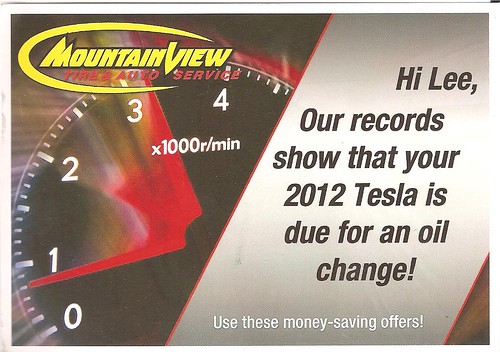Red Sage
The Cybernetic Samurai
It's... erm... still running...?It's an electric motor, just like your refridgerator, how many miles on your fridge?
You can install our site as a web app on your iOS device by utilizing the Add to Home Screen feature in Safari. Please see this thread for more details on this.
Note: This feature may not be available in some browsers.
It's... erm... still running...?It's an electric motor, just like your refridgerator, how many miles on your fridge?
Not to mention the, "Here, hold my beer..." demonstrations......or subjected to repeated "Watch this!" 0-60 abuse.
Robin
I think the differential fluid has to be changed once every 10 or 12 years or something... That probably presumes 15,000 miles per year or so... Maybe once every 150,000 to 180,000 miles?Speaking of power train, I understand there is no transmission, but still there must be some kind gear fluid which might need changing. Maybe owners of MS might know?

It's... erm... still running...?
Some people mock juvenile humour when they become adults. Those people are not much fun at all. The way I see it:Well then you better go catch it ....Sorry, had to.
On a related note, I called store once (I think I was like 12) and asked them if they had Prince Albert in a can, the guy that asnwered didn't miss a beat, he said, "We sure, but don't worry we let him out every night."
I believe the owner's manual recommends that this fluid should be changed every ten or twelve years. I also don't think that's hard-and-fast, though, sort of like the Tesla check-ups. Some people do it, others don't and Tesla doesn't have a problem with that.Speaking of power train, I understand there is no transmission, but still there must be some kind gear fluid which might need changing. Maybe owners of MS might know?
Maybe, except Drive Unit Replacement Poll is on his 8th DU.Drivetrain replacements were mostly limited to the early single motor versions of the car
Maybe. I'm not sure, but here instances of seemingly different probs w/the D (AWD) models:The problem(s) were seem to be resolved for the second generation units (post dual drive).
Maybe, except Drive Unit Replacement Poll is on his 8th DU.
He's not the only person w/multiple replacements. There are at least a few folks w/more replacements than this guy: 6th drive unit replacement and more.
Maybe. I'm not sure, but here instances of seemingly different probs w/the D (AWD) models:
Dual engine shut down on freeway. Anyone else?
P85D rear oil leak? WHAT
P85D Front Motor Died
Maybe, except Drive Unit Replacement Poll is on his 8th DU.
He's not the only person w/multiple replacements. There are at least a few folks w/more replacements than this guy: 6th drive unit replacement and more.
Maybe. I'm not sure, but here instances of seemingly different probs w/the D (AWD) models:
Dual engine shut down on freeway. Anyone else?
P85D rear oil leak? WHAT
P85D Front Motor Died
This reference highlights the context which is often got overlooked every time discussion focuses on reliability: cars designed for high performance are not the most reliable, while the ones designed with reliability as a priority are not among the ones with highest performance.
For context, average problem rate chart near the bottom of Car Reliability History | Detailed Ratings - Consumer Reports represents the average problem rate for a given model year of car over a 12 month period in their most recent survey. For '15 model year cars, it's a much shorter period.... and most everyone else is fine
Mercedes has not been known to have good reliability for MANY years and the S-Class is usually below to much below average. People here seem to like to compare reliability to BMW and Mercedes, neither of which have good reliability. Audi is also a frequent comparison, but (IIRC), they've improved from spotty to ok now.Speaking about the context, based on the statistical data collected by the Consumer Reports 2016 Tesla Model S reliability is predicted to be 43% below average, while Mercedes Benz Class S reliability is predicted to be significantly worth - 71% below average. Note that both cars have enviable 100% owners satisfaction rate.
Eventually will only happen if they do it before they die. Not sure if there's a precedent for Japan giving hand-outs to car companies like the US does. They led the pack in hybrids, so I don't understand where the roadblock is with making a bigger battery with faster charging, a higher-wattage motor, and a beefier inverter to make it possible to ditch the ICE entirely.I hope Tesla will strive for Toyota level durability. Eventually Toyota is going to wake up and start making EV's.


